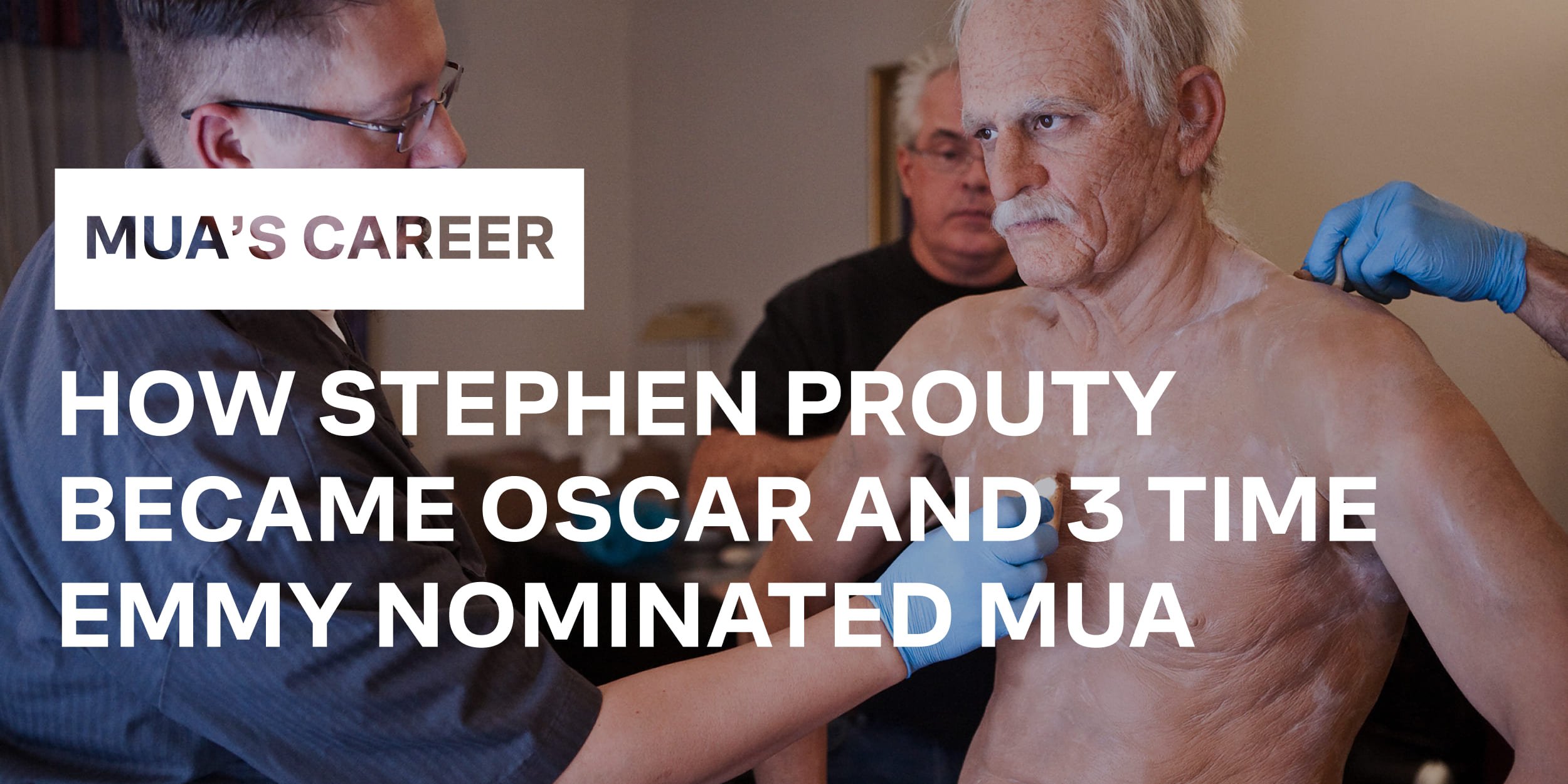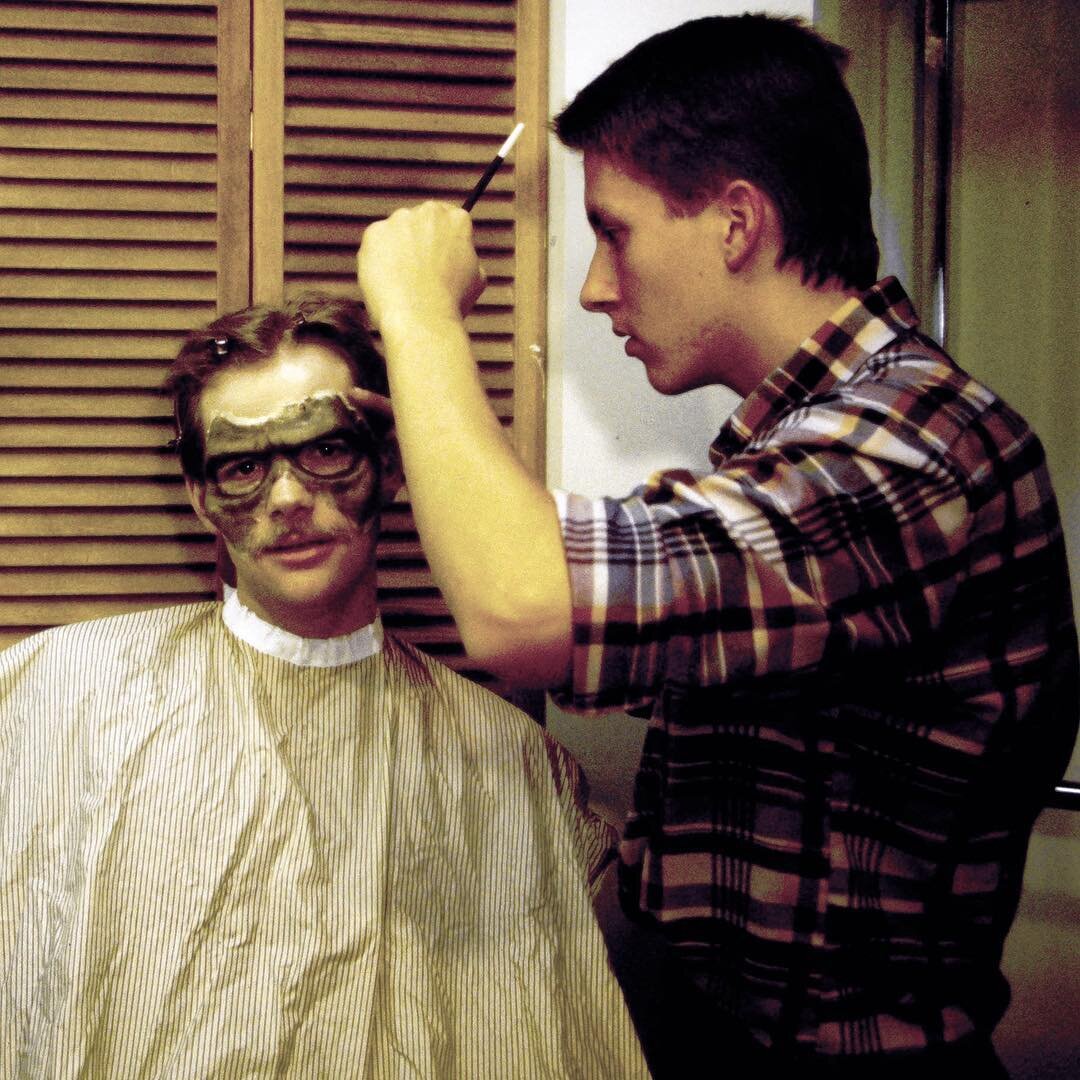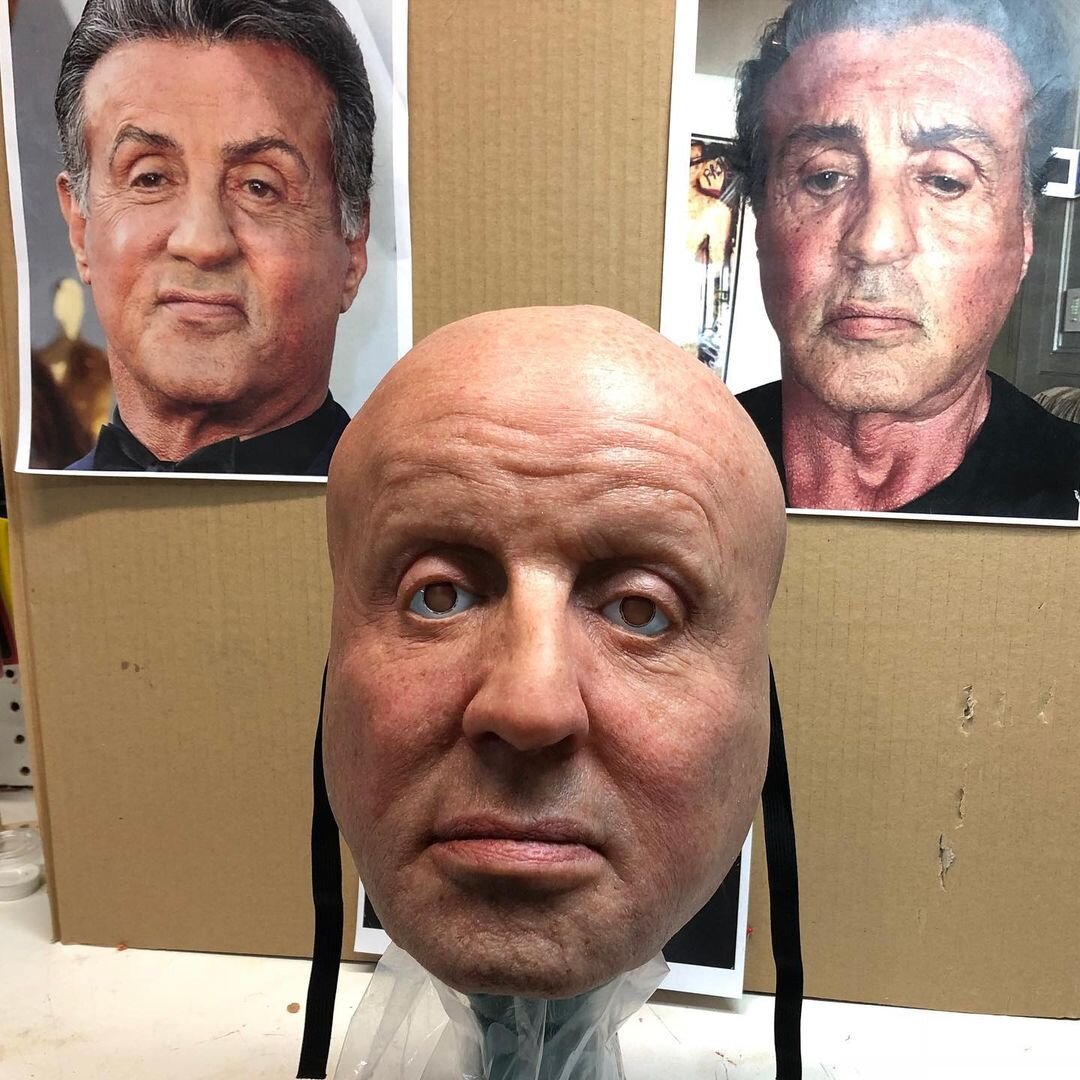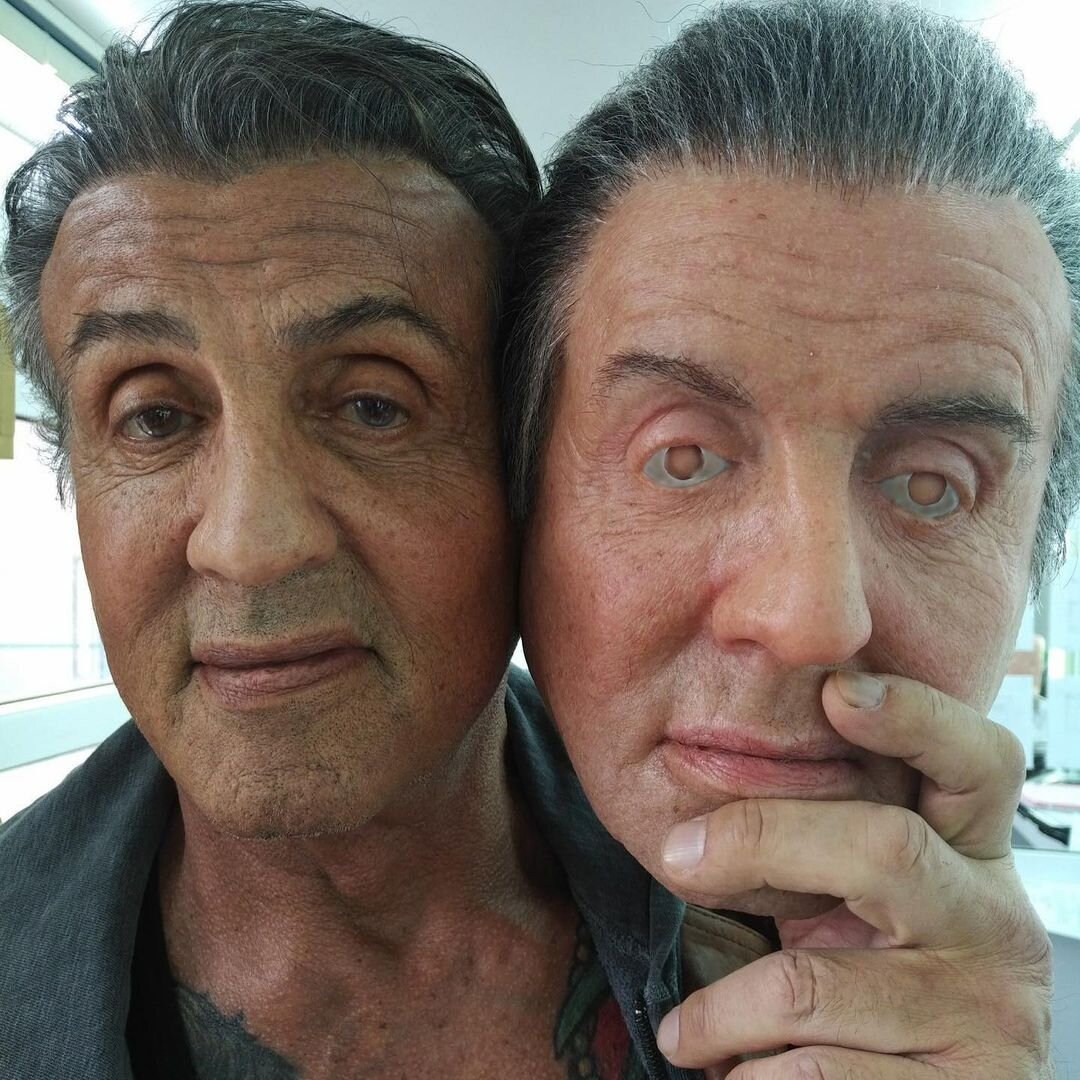Injuries and Fantasy: How Stephen Prouty became Oscar and 3 time Emmy nominated makeup artist
When you are working towards a dream, inspiration can always come in handy along the way. To keep you on track, we want to share with you the success story of one of the most talented SFX makeup artists, Stephen Prouty. Oscar and 3 time Emmy nominated makeup artist Stephen Prouty is known for his work on Bad Grandpa (2013), Zombieland (2009), and How the Grinch Stole Christmas (2000). He formed FusionFX studio in 2013 in an effort to provide state of the art makeup effects services that are tailored to individual productions in the ever evolving entertainment industry. With over 30 years working as a makeup and makeup FX artist, Stephen saw a need to reimagine how makeup effects are integrated into productions.
We had a wonderful opportunity to talk to Stephen — with Online Makeup Academy, he shared his story about how his successful career as a makeup artist developed.
Stephen realized his love for makeup at an early age. When he was around 13 years old he took acting classes at a local community center outside Atlanta, Georgia. The teacher showed the kids basic stage makeup techniques and Stephen found that more interesting and began collecting anything he could find at bookstores and libraries related to makeup. He collected as many materials as he could locally and practiced on just about everyone he knew. Eventually Stephen started to get small jobs working for a physical effects artist named Bob Shelly, who really gave him his first breaks into the industry. Stephen would make rubber copies of weapons, stunt dummies, or anything Bob needed. The first film set he was on was a 1980’s movie called The Heavenly Kid. Stephen was 15 years old and he says that through this experience he was able to see firsthand how a set worked and was instantly hooked. “It definitely set me on my path. This was the career that I would pursue.” — said Stephen. 20 years after Stephen left Atlanta for Hollywood, his career came full circle as he went back to Georgia to film Zombieland and was able to work again with Bob who was handling the special effects for the show.
For the past several years Stephen has run studio FusionFX in the Los Angeles area. If your dream is to create your own makeup studio, take advice from Stephen and his day in the life: Stephen tends to put in 10 to 12 hours a day working on shows there. He is very hands on, as he called himself, “probably a control freak”, so he does a lot of the work himself keeping very small crews. “I like to have people working with me with a broad spectrum of skills. If you sculpt something for me there’s a good chance you’ll be molding it and running the piece as well,” — he says.
In any career, as in life, not everything goes smoothly. Of course, it was interesting to know if there were any failures in Stephen's career. He admitted: “If I had to name some top ones I guess getting in to a screaming match on set with a DP (that was ugly and a very long time ago), showing up late to work (a big no no, only happened a couple of times) and being overly competitive early in my career.”
Through working in the industry for all those years, Stephen shares that he has learned a lot of things by working with many talented artists and technicians: “One thing I learned is that it’s not all about you. On set, you are part of a team and should always conduct yourself that way.”
Since Stephen works mainly in the film industry, of course, we could not help asking him more about working with directors, and about his favorite films and actors.
Although The Heavenly Kid was his first film he worked on, as Stephen says, it was more as a special prop maker. A movie called Truth or Dare in 1985 was his first credited SPFX makeup job. Stephen was 17 and still in high school. His friend Bob Shelly was in Florida on the show and called him up to see if he could come replace the makeup artist there because he had quit from the film. Having no fear (as most teens do) and approval from his parents who let Stephen leave school for a couple of weeks to work on set, he jumped on a plane the next day and started a career. “I was super excited and thought I knew it all. Which I didn’t. Luckily I knew enough of how to put together what they needed out of my motel room “shop”.”
Stephen's impressive portfolio also includes work on the Pirates of the Caribbean film. “I primarily spent my time in the background tents making pirates, tribesmen, stunt doubles etc. Those types of films are good in one respect as they tend to shoot for a very long time (job security) but the downside is that the vast majority of your makeup will be barely used at all.”
Another major project Stephen worked on is the Captain Marvel movie. Which was Stephen’s favorite look and how did he create it? Stephen told us that it was a fun show. Since the Skrull makeups were complicated their department head Brian Sipe had the artists double team each makeup look. Stephen considers that this can sometimes be difficult if you are partnered with someone who’s style and speed is vastly different than yours. Luckily he was paired with Jennifer Aspinall. “A true artist and incredible person to work with,” — he says, — “We worked very well together and each brought something different to the table. Different but complementary.”
Stephen worked with a lot of very talented directors. A couple that stand out for him are Macon Blair (I Don’t Feel At Home In This World Anymore) and Jeremy Saulnier (Green Room). “Both of these gentlemen have a deep love and understanding of practical effects and makeup. The conversations come easy because we speak the same language of filmmaking. On both their projects I felt as if my contributions mattered and were appreciated. That’s really important to me.” — says Stephen.
Stephen has been fortunate to work with many talented performers. As he says, there’s the occasional quirky one but even those have been generally good experiences. “I always want what I do to be a collaborative effort with an actor. I seek their thoughts and opinions on their looks. Even if it’s a background alien that you’ll barely see, that actor deserves to share their input. After all they are the one bringing your work to life on camera.” — considers Stephen.
Stephen's portfolio is dominated by science fiction films. He admits it is his favorite genre as science fiction, fantasy, horror allow the imagination to run wild. The most bizarre characters and situations can exist there. Definitely a departure from real life. Stephen convinced: “I think that’s what I see films as, a medium that gives you permission to escape from the everyday world. Later in life I began getting quite a few tattoos. They are images of films that inspired me as a kid, The Exorcist, The Howling, Close Encounters.”
Since Stephen has been in the industry for over 30 years, we were curious to hear the opinion of such an experienced professional on modern and past tools and products used in makeup. Starting out it was latex, spirit gum and greasepaint. Now it’s silicone, Telesis adhesive and tattoo ink paints. Stephen still uses ultracal and hydrocal. Latex and foam latex play a role in his work as well. Silicone as a “skin” and prosthetic material was definitely a game changer in the early 90’s. Stephen tries to stay current on new products and techniques, always looking for better & faster ways to accomplish a task. Digital media has made it crucial to be as clean and detailed as possible.
Of course, Stephen could not help but give advice as a professional to novice makeup artists. He shared not only advice, but also what once inspired and influenced him. The one book he tells every new artist to get is Lee Baygens “Three Dimensional Makeup”. Written in the 1970’s it goes into great detail about many aspects of prosthetic creation. The materials may have changed but the basic principles are the same. Another great book that Stephen recommends is Richard Corsons “Stage Makeup”.
For other MUA's who want to get started or are just starting out Stephen gives the following advice: “Know the history of our industry. The names and accomplishments of those who came before us. Also learn several ways to accomplish the same effect. For example, you never know when you’re going to travel to a location job and have all your supplies stuck in customs and you still have to go to set the next day and give your actor, let's say, a swollen eye makeup. You should know how to go to the local arts supply or hardware store and get the items you need to make something that will work. Problem solving is very important to success.”
To learn more about Stephen Prouty:
Instagram: @fusionfxshop
Website: fusionfxshop.com










